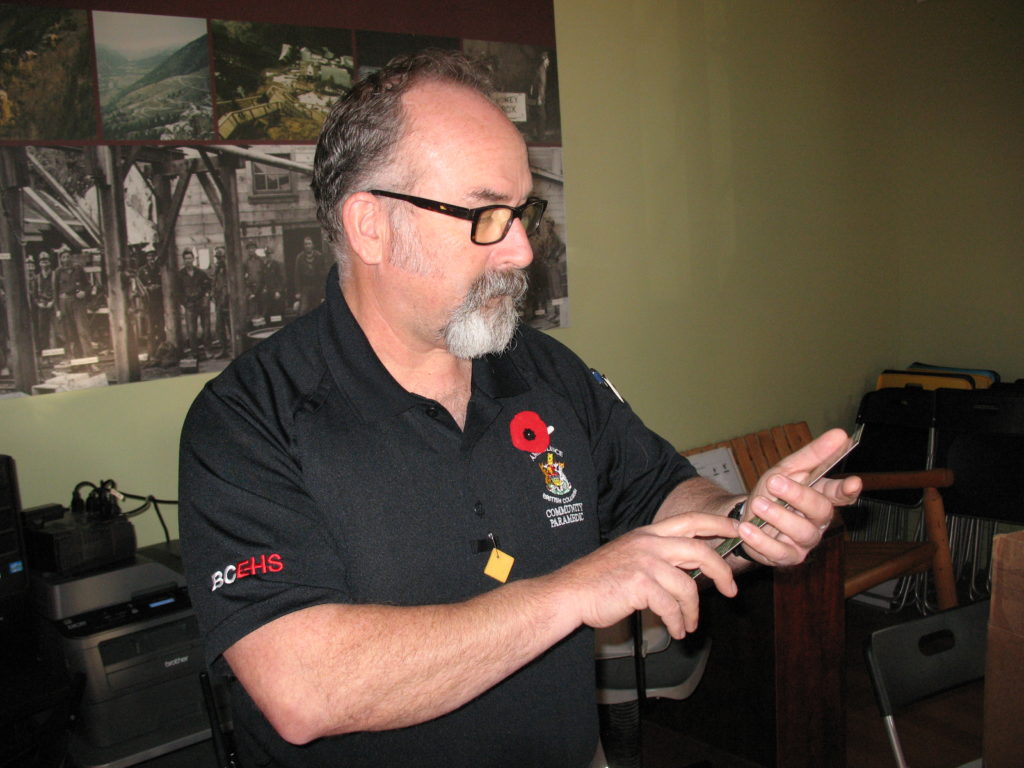
A few weeks ago, at the end of his rookie year in politics, Tim Roberts agreed to talk about his experience as an RDOS director to this time. “I knew it would be difficult,” he began. “It’s been a steep learning curve, and the learning isn’t nearly done.” He leaned back in his chair, then after a moment of reflection said, “It is easier, though, when I believe what I’m doing is right.”
Running for Area G Director was not a spur of the moment decision for Tim. “I was asked several times over the years to let my name stand,” he said, “but I was concerned it might interfere with my advocacy for community health. As a paramedic with the BC Ambulance Service, I go into a lot of homes. I didn’t want people to feel uncomfortable when they invite me into their home or their crises. I asked a doctor and also a health lead at the band if this would jeopardize my relationships.”
Even then he pondered until the last day, and just about the last minute, before submitting his name. The hesitation seems to suggest his motivation is not to acquire prestige or power. He appears to genuinely hope to make a substantive contribution to Similkameen communities.
As he talked, it became evident to me Tim has an inquiring mind and a steely resolve, essentials for navigating the often confusing bureaucratic maze that inevitably develops in government. He recognizes the importance of understanding concepts and systems. “I ask a lot of questions,” he said, “like what is the bylaw for this particular issue, and what does it mean? I need to know who has jurisdiction and what is their mandate. I want to understand how the RDOS functions. Asking questions helps me decide if an idea is worth pursuing.”
Tim explained that the RDOS is a mechanism for the provincial government to deliver services to unincorporated areas. “I think of it as a tool box to get things done. Sometimes I wonder why we can do this, but not that. It has taken me a year to learn how to ask questions in a way that provides information I need. To adjust spending I at times have to go to the province.”
Tim thinks of himself as an advocate, not a politician. “One of my goals is to educate people as to how the system works. I try to find out what people need and want. I’ve had two Open Houses and one Leadership Forum. I’ve sent out a survey to obtain opinions on Land Use. I’m looking for effective ways to communicate with people. There will be more mailings.”
He’s pragmatic and understands that “if we take care of a problem, that comes at a cost. If we can spread a service over a larger area, the cost is lower. We need to strive to be financially stable.”
Tim has learned his powers are limited. “Sometimes I have to tell people there isn’t money for what they want. Some requests are outside my area of jurisdiction.”
Although Tim is a B.C. Ambulance paramedic and operates a small farm, he finds time for community events. When Hedley’s water system was not functioning for a few days, Tim showed up at a Community Club lunch pushing a dolly loaded with bottled water. Last week he manned a table at the ChuChuWayHa Health and Wellness Fair.
I’ve been surprised at how often he shows up in our community, engaging in conversations. “I love talking with band elders,” he said. “I also enjoy conversations with Ralph McKay about Hedley’s mining history, and with Gerry Wilkin at the Museum.” He is aware many people in Area G are retired and elderly. It concerns him that they are often socially and physically isolated, with few services.
At the end of our conversation Tim said, “Change is coming. We can’t know what it will look like, but I want us to be prepared to respond.” He paused, then said, “We need to think about what we want for our children and grandchildren in the next 30 years. We are the only area that doesn’t have an Official Community Plan (OCP). That will take about two years to develop. I’m looking for ideas.” Then he was gone, probably to another appointment or meeting.
Tim Roberts is collaborative, a team player. Certainly not a baby kissing, back slapping, photo-op politician.
